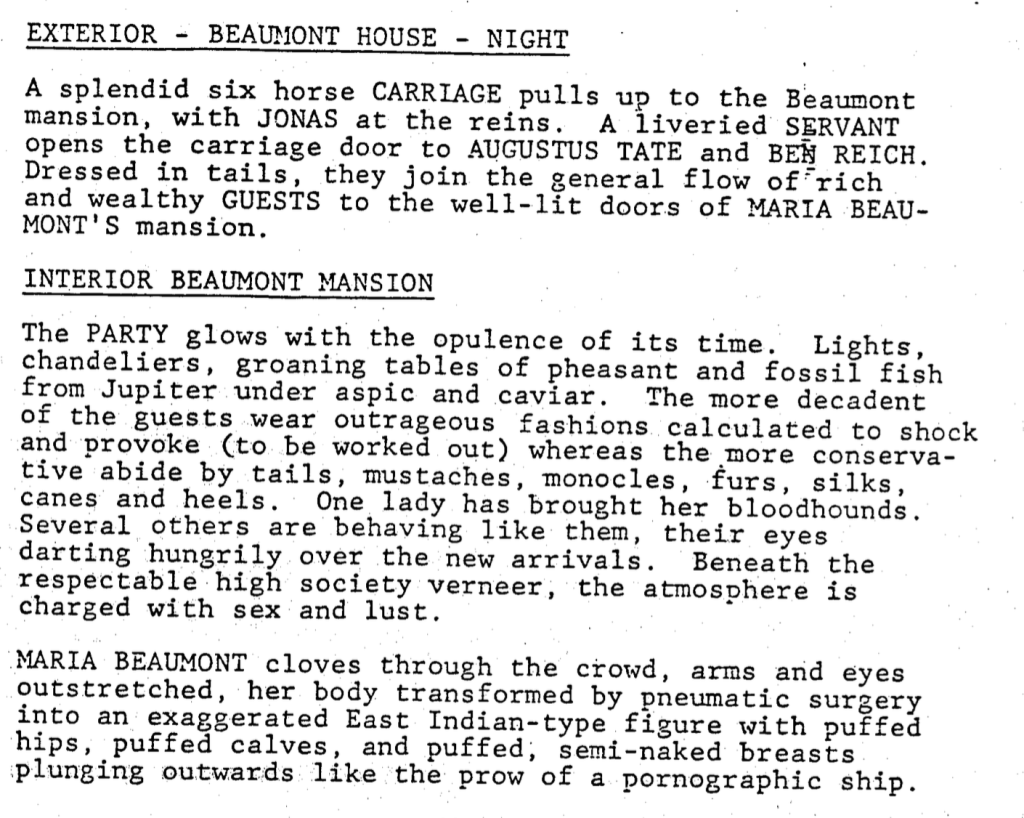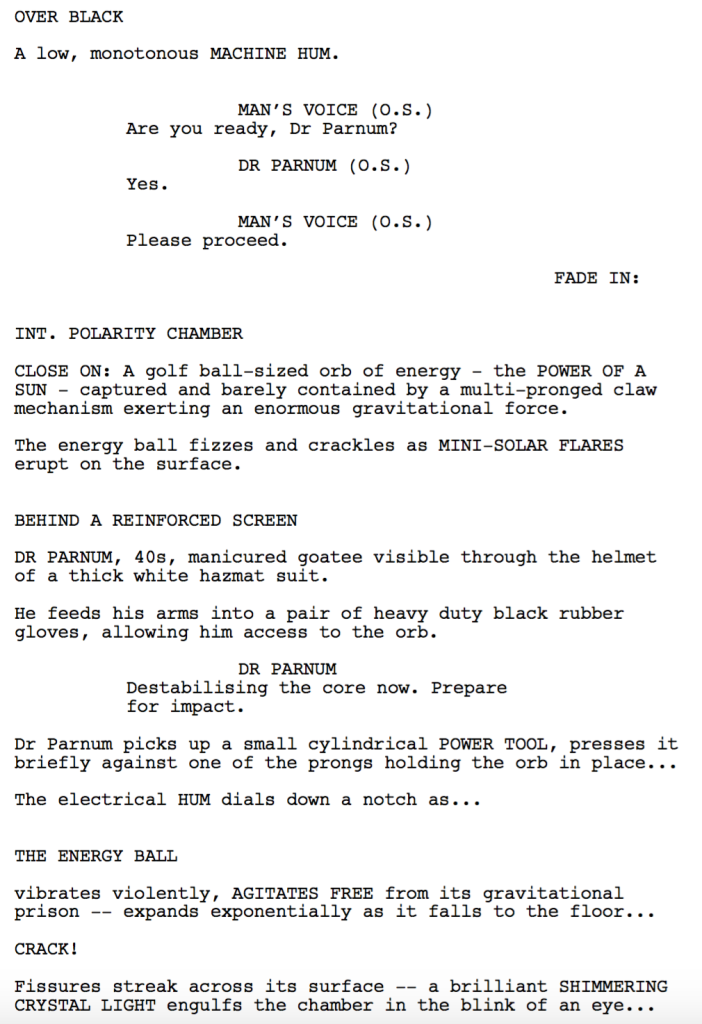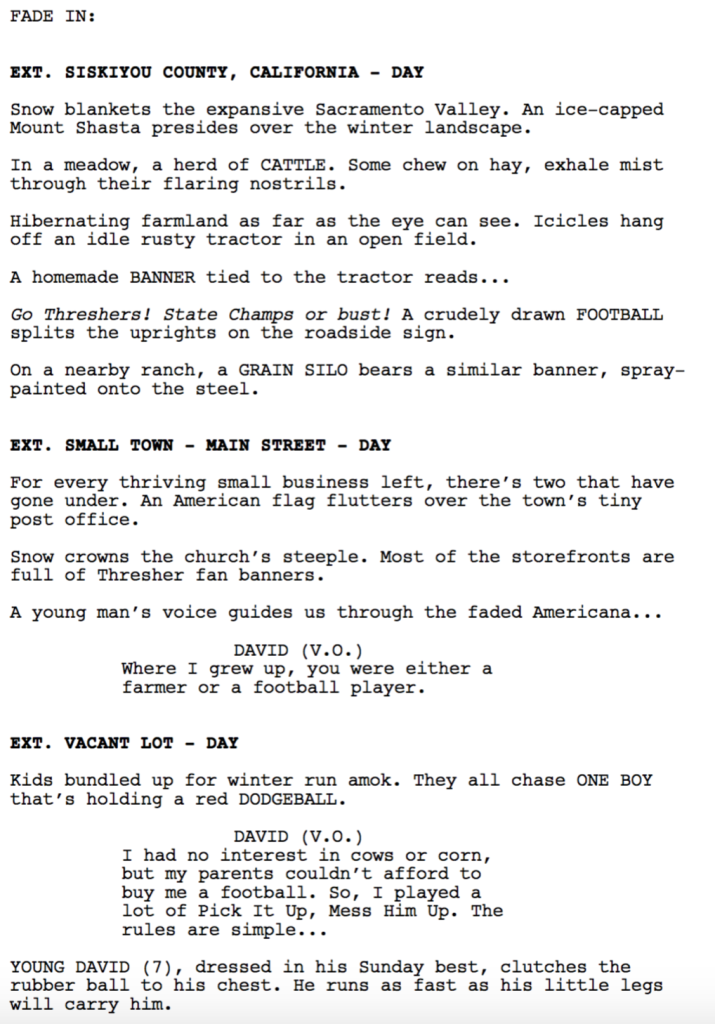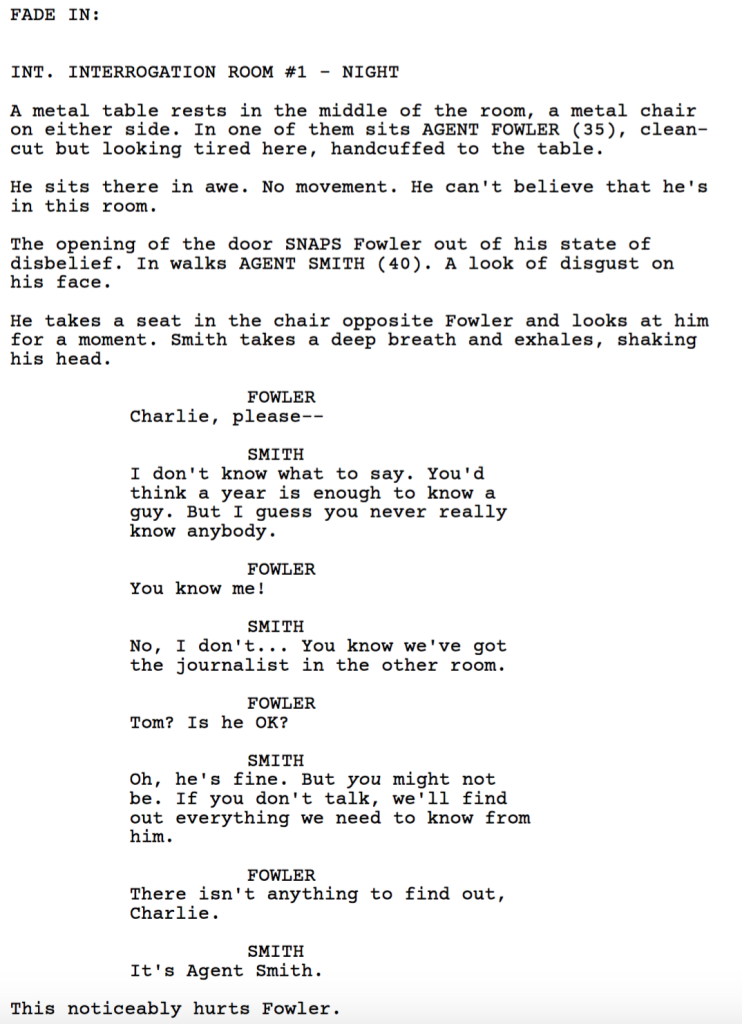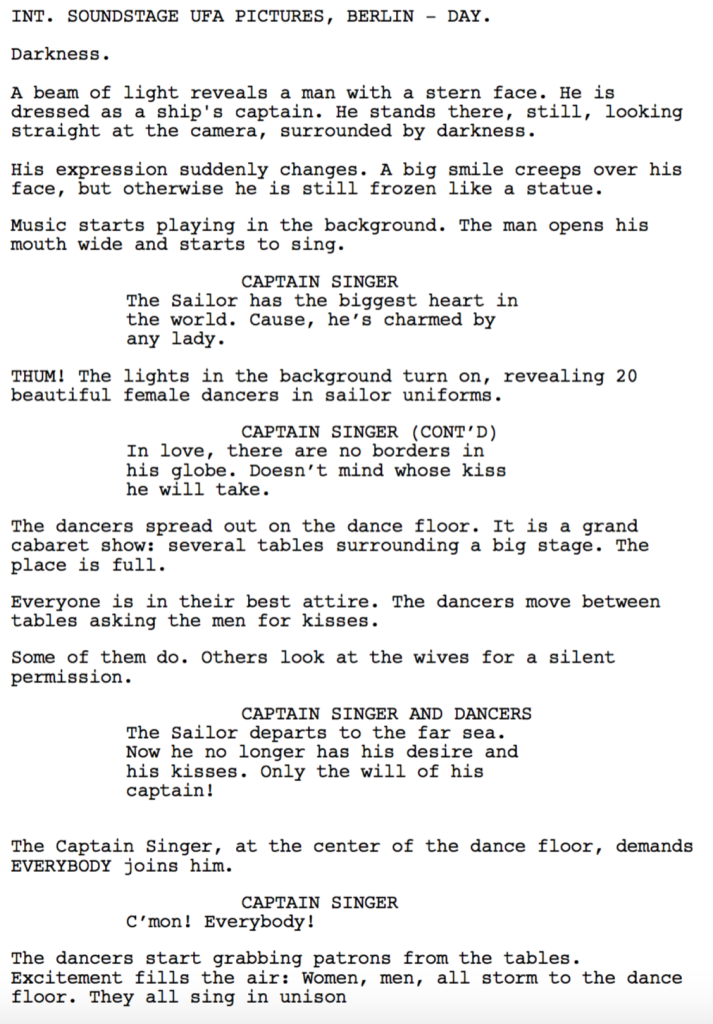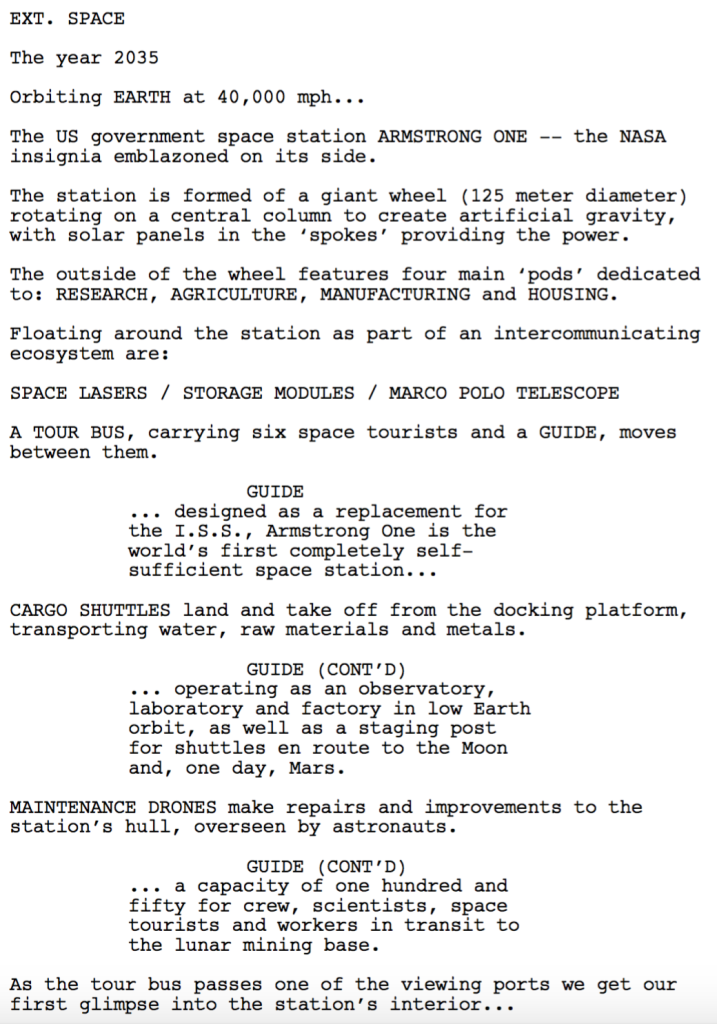Search Results for: the wall
Genre: Sci-Fi
Premise: In the year 2491, a Citizen Kane-like business mogul attempts to do something that hasn’t been successfully achieved in 80 years – murder a man without getting caught.
About: Before Oliver Stone became a visionary director, he was one of the most coveted writers in Hollywood. This was one of his early assignments, an adaptation of the science-fiction novel, “The Demolished Man,” the very first Hugo Award Winner (in 1953).
Writer: Oliver Stone (based on the novel by Alfred Bester)
Details: 122 pages – 1980 draft
Opening these old screenplays is a bit like opening an ancient scroll. You have no idea what you’re going to find. Another language? An entirely new screenwriting format?? Remember, this was pre-1990s, before the screenwriting market was deluged with How-To books. This meant that screenwriters took their time and wrote screenplays more like they wrote novels, with less emphasis on getting the reader in and out in 90 minutes.
It’s also nice to see a sci-fi adaptation from Stone, someone you don’t typically associate with the genre. However, as soon as you start reading “Demolished Man,” you can tell why he became attracted to the material. We have a CEO of an enormous company as our protagonist. We have money, corruption, and power. You could argue this is Wall Street in the year 2491. Let’s check it out.
Ben Reich, the CEO of Reich Industries, is a seriously wealthy man. He’s got products on Mars, on Jupiter’s moons, he’s even got an outpost at the edge of the galaxy. But Reich’s got a problem. His nemesis, Craye D’Courtney, is stealing all of his business. If he doesn’t do something soon, Reich Industries is going to be in some deep shit.
So Reich comes up with a plan. Murder Craye. That may be easy in 2017. But 2491 is a lot different. In the future, we have these people called “Espers” who have the ability to read minds. This has made murder impossible to get away with. An Esper can come in, read your mind, know you’re guilty, and it’s straight to the electric chair. Or whatever chair they use in 2491. The… laser… beam… chair?
However, Reich hires a first-class Esper, Tate, to stick with him throughout the murder and its aftermath. You see, Espers can protect against the mind-reading powers of other Espers. This allows Reich to successfully murder Craye D’Courtney at a party, and when the Esper police come by, they’re none the wiser on who did it.
One problem, though. As Reich was killing Craye, Craye’s daughter entered the room, saw the murder, and ran. So now Reich’s got a witness to the murder on the run. Which means he must find her and kill her too.
This begins a cat and mouse game between Reich and the lead Esper on the case, Liz Powell. Both of them go hunting through a grimy 2491 New York City to find this girl, a girl we learn nobody knew existed in the first place. Powell’s able to catch up with her first, but only after she’s been memory-wiped by a scientist who’s pacing her through a “regrowth” so that she can overcome the crippling shock of seeing her father killed.
Reich realizes that once the daughter regains her senses, she’s going to sing, which means Reich has to kill Powell before the daughter reboots. This forces the two sides into a showdown, where Powell recruits all the Espers to perform a mass Esper mind meld on Reich, in the hopes of stripping him of his monopolistic hold on New York, the U.S., the planet, and the solar system, for good.
I’m going to go out on a limb and say, if this is what people considered “award-winning science fiction” in 1953, Bester didn’t have much competition. I don’t think I’ve ever seen a script go south faster than this one. One second we’re engrossed in a compelling science-fiction murder investigation with tons of fresh ideas. The next we’re lost in some kind of bizarre drug-induced fever dream.
I’m talking this went from Philip K. Dick to L Ron Hubbard.
I coulda swore LSD didn’t hit the American streets until the 60s. Apparently, Bester got an early shipment. I mean, you expect this kind of stuff from Stone, who’d rather write a 20 page dream sequence than well-plotted third act. But Stone was working off material that was trippy long before he was.
Maybe it had to happen this way. This is how sci-fi began. Writers thought you threw as many ideas as you could possibly come up with into a giant novel stew and just the pure imagination of it all was satisfying to a public who had limited access to interesting ideas.
In time, we’ve learned that the “everything-and-the-kitchen-sink” approach rarely works. The best science fiction movies are simple. A clear set of rules are established early – such as being able to manipulate time and space a la The Matrix – then you spend the rest of the movie exploiting that simple rule-set.
The Esper stuff was interesting because it was a fresh way to look at murder. How do you murder someone if the detectives can read your mind? That’s a simple premise. They then exploited that premise. You solve this problem by employing a counter-Esper, someone who can block out the investigator’s powers. You’ve got a movie there.
Bester, before he went insane, also made the crafty decision to introduce the daughter into the mix. You see, if he doesn’t do that, this plot doesn’t have a purpose. The movie would be about Reich hoping the cops didn’t figure out he was the murderer. Think about that for a second. What is a character who’s “hoping something doesn’t happen” doing the whole movie? A whole lot of nothing.
Because the daughter witnessed the murder and escaped, Reich now has a goal – find and kill the daughter before she can identify him. A strong goal makes your hero ACTIVE, which gives your plot THRUST, which almost always, assuming you’ve done your job on the character end, results in an entertaining story.
Demolished Man is one of the few times this combination DIDN’T result in an entertaining story. And that’s because the writer kept throwing a bunch of random weird science-fiction shit at the story, further complicating things and taking us away from the core dramatic question – which was: would our main character get away with murder?
The daughter is captured by some scientist and reprogrammed to grow up from baby to adult in three weeks? What in the living fuch?? Reich is placed under some mind meld where one-by-one, the elements of the universe are stripped away from him until he doesn’t know which way is up? Uhhhh… are you kidding me? What happened to the story?????
That’s the key question, guys. And it’s the one you should always be asking yourself with whatever you’re writing. Am I sticking with the story? If you’re going off and screwing around with dream sequences and weird subplots that do nothing but distort the story’s purpose, you’re losing. You’re losing at screenwriting. Stay on track. Stay focused. Storytelling is simple-telling.
And one more thing. There are people who think I’m too hard on creativity. That when “challenging” material that doesn’t fit into the “proper” screenwriting paradigm like Baby Driver or Blade Runner 2049 or Upstream Color come around, I wrongly condemn them. That’s not true. I like challenging material if it’s a WELL-TOLD STORY. I loved Room. I liked Colossal. I liked Swiss Army Man. I loved Memento.
There’s a difference between mental masturbation and having a plan to tell a good story uniquely. Unfortunately, Demolished Man falls into the former category. And that’s too bad. Because it had the beginnings of a really cool film.
Screenplay link: Demolished Man
[ ] What the hell did I just read?
[x] wasn’t for me
[ ] worth the read
[ ] impressive
[ ] genius
What I learned: I’ve read about 100 scripts now with futuristic New Yorks. So I’ll give you some advice based on what I’ve found. Just making New York bigger than it is now isn’t enough. Giving New York a sprawling seedy underbelly isn’t enough. Those two things are in every single future New York I’ve read. If you’re going to write about future cities, you have to look for imaginative ways that redefine how we look at them. Try to outthink your competition. Ask yourself, “Is this thing that I’m adding something that nobody else has thought of before?” If not, keep trying. In Demolished Man’s New York, the buildings had gotten so incredibly tall, no sun reached the city anymore. It was all shadows. So they installed these giant artificial “Sun Embers” throughout the city to keep it lit during the day. I’d never seen that before. That’s the kind of imagination I want from you guys.
Logan Martin’s script, “Meat,” becomes the first amateur script to make it into my Top 25 in over 5 years!!
Genre: Mystery/Horror
Premise (from writer): A misanthropic man notices bizarre changes in himself, his wife, and the animals inhabiting the territory around their homestead as they attempt to survive self-imposed isolation.
Why You Should Read (from writer): After moving from North Dakota post-college at the end of 2016, I started to write scripts in my spare time and fell in love with it. My first screenplay placed in the top 20% of the 2017 Nicholl fellowship, and as of now I’ve “finished” five features and am working on my sixth. I aim to create original, meaningful stories, but even more so focus on presenting them in a unique way. MEAT has been compared to The Witch by readers due to its low budget, as well as its setting and tone. It’s an unconventional horror story that poses a moral question without appearing pretentious.
Writer: Logan Martin
Details: 72 pages!
Okay, I have to admit I’m a little nervous. I like this script so much. And I’m afraid I’m not going to convey all the reasons why in this review. I’m not going to articulate something or I’m going to forget a key reason for its awesomeness.
But the biggest thing I want to get across is that this is one of the best ways to break in as a screenwriter. Find a topic that interests you, come up with a story, then tell it in a way that best shows off your voice.
Because beyond this just being a great script, it’s a tremendous showcase for the unique way in which the writer sees the world.
Does that mean Meat’s perfect? That’s a tough question to answer. It’s perfect for what it is, for what it’s trying to be. But as a piece of screenwriting, it’s filled with lots of “mistakes” and rule-ignoring. However, I contend that following the rules is how you write a good screenplay, but breaking the rules is how you write a great one.
Meat introduces us to 30-something couple Ben and Rein. Ben and Rein are normal adults in every way but one – they live in the middle of nowhere, off the grid.
We learn later that they both had normal jobs, lived in the city. But at a certain point they became exhausted by the monotony of it all – the rat race, that thing all of us get sick of sooner or later. The difference is, Ben and Rein decided to do something about it. Or, maybe it was more Ben than Rein. But we’ll get into that more in a second.
When these guys say “off the grid,” they really mean, “off the grid.” To the point where they’re hunting their own food. Ben enjoys the thrill of the hunt, and he’s got a particularly healthy deer population to shoot away at. They also have rabbits skittering about, chickens, and a couple of pigs (Bert and Ernie) in their mini-barn next door.
Every night, Ben prepares some juicy red MEAT for dinner. He takes pride in the fact that he’s killed and prepared the meal. So there’s nothing that makes him happier than sitting with Rein after a long day and eating. That juicy bloody dripping red… meat.
The only thing left in life that agitates Ben is going into town. There are still supplies the two can’t obtain on their own. And so a few times a year, Ben has no choice but to make that trip to the grocery store and stock up on necessities. Ben dislikes his latest experience so much, he proposes to Rein cutting the store out completely so that they’ll finally, officially, off the grid. Rein’s hesitant but if it’s what Ben wants, she supports him.
As the days go by, we get the sense that Rein is having some regrets about this new life of theirs. It’s not blatant. She’s always agreeable and on board with her husband’s choices. But Rein may not have envisioned that “off the grid” was this off the grid.
And so one day she drops a bombshell on Ben. She no longer wants to eat meat. Ben stares at her, stumped. Hunting, preparing, cooking – they’re his favorite thing to do for her. “Why?” is all he can think of to say. While she doesn’t say it then, it’s clear that the process of killing animals and eating them has started to affect her. “Well, if that’s what you want,” Ben concedes.
And while they don’t know it yet, that tiny choice is the beginning of the end. Without a sufficient amount of food and protein, Rein starts getting thinner and thinner. Ben is increasingly frustrated with her decision, but he’s dealing with his own issues. Not long after that day, Ben goes hunting, and when he lines up a deer in his scope, he sees that a second deer, next to it, is… STANDING UP ON TWO FEET. As if talking. Ben lowers the rifle to watch the deer disappear into the woods.
Ben’s shaken by the experience as it was just so real.
As time goes by, Rein becomes more resistant to Ben’s hunting, and seems to be getting too close to the animals, particularly Bert and Ernie, their pigs. One day, one of the pigs gets out of its pen, and Ben goes chasing after it, following its tracks in the snow. To his shock, after awhile, the tracks turn from four separate feet… to just two.
And if that isn’t bad enough, the next time Ben goes hunting, he gets shot at. What the hell is going on? When he comes home later to find that Rein has made dinner with three table places instead of two, the truth of just how fucked up things have gotten comes to light. But what Ben doesn’t know is that it’s gotten far worse than he can imagine. And that he finally may be the hunted, rather than the hunter.
Oh man. Where do I start with how good this was!
Let’s start at the top and discuss the TENSION in Ben and Rein’s relationship, something that was felt from the get-go. This choice was paramount to the script working because, remember, 80% of this script is two characters. So you need some sort of conflict to make that interesting for that long. By adding this underlying tension to Ben and Rein’s relationship, you build SUBTEXT into every conversation they have. Every word has an additional meaning. A simple “How are you?” doesn’t mean “How are you?” It means, “Why aren’t you talking to me? Why are you acting so weird? Did I do something wrong? I’m trying to be respectful here and not push but I’m getting frustrated.”
This is something newbie screenwriters don’t get. Every time a character in one of their scripts says, “How are you?” it literally means, “How are you?” Which is boring. And that’s not to say sometimes “How are you?” can’t mean “How are you?” But it’s when EVERY line is literal that dialogue becomes patently boring. This is where the critique, “Your dialogue is on-the-nose” comes from.
Martin needed to stick the landing on that relationship because, as many of you noticed, there wasn’t any GSU in Meat! “Yo Carson. Didn’t you say all scripts need GSU to be good? Why you lie?” Sheesh, get your bloody meat hooks off me. GSU is the main ingredient required for mainstream genre screenwriting – horror, thriller, action, adventure, sci-fi. But it isn’t a writer’s only option. And it’s used less frequently with indie fare, which is what Meat is.
If you’re not going to utilize the GSU formula, your next best option is creating a dramatic question that drives the narrative. That’s a fancy way of saying: Have an overarching question that the audience wants to see resolved. In the case of Meat, it’s “Are these two going to make it?” It will, of course, be up to the individual reader to determine whether that question is interesting enough for them to be invested. And I would assume that, for some of you, it wasn’t. You didn’t care if these two “made it” or not.
This is the danger of moving away from heavy horsepower storytelling tools like GSU (goal, stakes, urgency). Is that people with short attention spans or less interest in the psychological battles of characters aren’t going to jump on board.
But see, this is why I think Meat is so great. It’s not just about the frame-battle between its two main characters. Martin starts adding little mysteries here and there that add layers to the story. When Ben starts seeing animals propped up on two legs talking, it’s like, what the fuck is going on? And when he starts getting shot at, it’s like, who’s shooting at him?? It could be their neighbors, it could be Rein, it could also be… the animals he’s been hunting.
And there’s actually one big advantage to a non-GSU script. It’s easier for the writer to stay ahead of the reader. If your hero has a clear goal, like getting the Ark of the Covenant or killing the terrorists, there aren’t a ton of ways to achieve that goal. As readers, we have a good sense of how things are going to play out, even if we don’t know the exact path by which we’ll get there.
Without that clear end point, the writer can yank the reader around in a multitude of unexpected directions because the narrative isn’t being pulled towards an obvious one (kill the terrorist). And that’s why I enjoyed this so much. I had no idea where it was going, pretty much up until the final page. And I can count the number of times that’s happened in the past year on one hand.
Now a lot of you may point out the short page count. And yes, I agree that that’s a problem. The industry standard for a feature is between 90-120 pages, with the sweet spot being between 100-110. However, if you are going to make a mistake in this area, it’s better to be on the low end (less than 90) than the high (over 120).
I fought with the 75 page count for awhile, wondering if it was because of the lack of dialogue. Dialogue takes up more space, so if you don’t use a lot of it, your script is going to be shorter. And there wasn’t a lot of dialogue here. Which I liked, by the way. It made it so that each time there was a conversation, that conversation had weight.
In the end though, I think this needs to be beefed up (no pun intended). You need one more subplot. And I’m not sure where that’s going to come from. I’d love to hear your suggestions in the comments. I’m thinking Ben gets most of the focus here. So a subplot that focuses on Rein would be nice. Maybe something where she spends more time with the pigs and chickens, especially since the pig payoff in the end is so great. If we can just get this up to 85 pages, I think you’ve got enough for a feature.
Man, I really liked this. Never has a sentence as simple as, “I don’t want to eat meat anymore,” shaken me so much. And that’s a testament to Logan and his amazing ability to capture the depth of this fractured relationship. I mean hell, this script even had a dream sequence in it (a HUGE Scriptshadow no-no) that a I liked. Has the screenwriting sky fallen?
I would love for “Meat” to get as much publicity as possible because I think it deserves to make the Black List. It’s exactly the kind of script they used to celebrate before they went all true-story/biopic. Hopefully the industry recognizes that it’s still possible to write original unique stories. Great job, Logan. I hope this script jump-starts your career!
Script link: Meat
[ ] What the hell did I just read?
[ ] wasn’t for me
[ ] worth the read
[x] impressive (Top 25!!!)
[ ] genius
What I learned: Learn to dramatize your ideas. Say you want to make a statement about our society’s obsession with killing and eating animals. The bad writer will come up with a series of scenes of characters debating the issue. “Meat eating is bad.” “But we were put on this earth to hunt. We need food.” “If slaughterhouses had glass walls, no one would eat meat anymore.” Watching and listening to shit like that is nauseating. As a writer, what you want to do is DRAMATIZE your idea, like Logan did with “Meat.” In order to make a statement about this topic, he placed two characters up in the middle of nowhere where they had to hunt their own food then had one of the characters no longer want to participate, leading to an organic exploration of the moral implications of an animal-killing meat-eating culture. Always look to dramatize your ideas!
Make sure to get those amateur entries in. There WILL be an Amateur Offerings this weekend. Title, Genre, Logline, Why We Should Read, plus a PDF of your script to carsonreeves3@gmail.com
Genre: Period
Premise: During World War 2, a famous Jewish director was coerced by the Nazis to produce a propaganda film showing the concentration camps as a spa for Jews, all while being a prisoner in one. Based on the true story of Kurt Gerron.
About: For the past seven years, I’ve been writing, directing and producing my own short films. Since my love for making movies is bigger than my wallet, I almost went bankrupt because of it. With that said, a year ago I wrote this screenplay after a FULL YEAR of research. The story is full of irony, and I never understood why no one had made a movie about Kurt yet.
Writer: Marcos Vaz
Details: 116 pages
It’s so great to hear that Marcos is out there doing exactly what I told you to consider at the end of yesterday’s article. Stop waiting for people to give you approval. Bypass the bullshit and be your own approval.
With that said, if this is Marcos’s plan for a first feature, I’d probably advise him to write a cheaper movie first. For those unfamiliar with budgets, any sort of period film is going to cost a lot of money, because you’re recreating a world that no longer exists. Old costumes, old props, old locations, old looks. That gets expensive fast.
However, this is obviously a passion project for Marcos and what I’ve found is that if you are going to make your own movie, intense passion will inspire others to join your cause. People will want to be a part of your movie and they’ll help you find ways to overcome financial restraints. That’s how a ton of movies get made.
So let’s see if the writing matches the passion here.
Kurt Gerron is a famous Jewish actor, writer, and most prominently, director. His plays are legendary. And he’ll be the first person to tell you that. This guy’s got one hell of an ego on him.
When Gerron and his wife, Olga, are rounded up by the Germans and sent to a concentration gamp in Czechoslovakia called Theresienstadt, they receive special treatment from the start. The head commander at Theresienstadt, Karl Rahm, is a huge Gerron fan. So, at first, things are going swimmingly.
Then Rahm gets word that the Red Cross will be visiting soon. They want to make sure that the Germans aren’t violating any human rights. He becomes concerned that nobody here looks happy (I wonder why). So he gets this idea: Have Gerron put on a play. People will have fun producing it. People will have fun watching it. It should lift the spirits of the camp so that everyone’s busting a gut by the time the Red Cross arrives.
Meanwhile, Rahm is putting together his own “play” – as in, he’s going to make the prisoners act like this place is a blast. He’s got scripts for the kids and the prisoners and the staff, who all must hit their marks, say the right things, smile and convince these pesky Red Crossers that everything is just wonderful.
Gerron speeds through pre-production but isn’t able to get a show together before the Red Cross arrives. Strangely, that turns out to be no problem, because the Red Cross found everything to be lovely, even going so far as to write a glowing letter that appeared in all of the world’s biggest newspapers.
Because things went so well, Rahm gives Gerron another task. He wants him to film a documentary of Theresienstadt and make it look like a vacation getaway. Gerron is thrilled that he still gets to put on a show and gets back to work.
Unfortunately, with the Russian army closing in and the end of the war nearing, Rahm is forced to ship as many Jews as possible to the killing camps, and Gerron ends up being one of those prisoners. In the end, he dies in the gas chambers of Aushwitz.
Okay Marcos. I’m going to get a little intense here. But it’s only because I see a lot of potential in this. Unfortunately, if we’re going to meet that potential, we’re going to need a page 1 rewrite. And that’s because the plotting is all over the place. The King’s Fool has no structure.
Gerron gets to this concentration camp and his mission is to produce a play that makes the prisoners happy so they won’t incite suspicion when the Red Cross arrives. This is a strange goal for a movie, since you’re basically building an objective that the audience wants the hero to fail at. If our hero succeeds, a camp full of Jews lives on in misery. Not exactly a situation to root for.
In addition to this, we have this odd secondary play going on where Rahm is directing all of the prisoners to follow a script for the Red Cross. I must have asked myself a thousand times, why wouldn’t you combine these two storylines into one and have Gerron be the one who’s directing the pretend happy camp?
Because clearly, Marcos had trouble plotting them both. First of all, the prisoners never got a chance to see the play! Which I thought was the whole point – they would see it, be happy, and that happiness would convince the Red Cross that everything was great. Instead, the Red Cross shows up, and decides everything’s great anyway. So then what was the point of the play plotline?
As if this wasn’t problematic enough, there were still 42 pages left in the script! And the main plotline was over! What do you do now? Marcos decides to introduce a new plot where Gerron is asked to direct a documentary of the camp. That becomes the driving force for the rest of the film.
Because this plotline comes on so late, it doesn’t have time to properly build. And by the time it does gain steam, we have to end it. Which puts a confused exclamation point on this structurally schizophrenic film.
I will say that I loved the moment in Aushwitz where he and his wife perform this dazzling scene for the camp, only for us to find out in the closing title cards that they were killed as soon as they got off the train. The problem was, it was so clumsy getting here that we can’t appreciate the greatness of this scene.
This goes back to advice I routinely give on the site yet still writers refuse to listen. Keep your story simple. The more you complicate things, the worse your script is going to get. Unless you’ve written 20 scripts and understand how complexity works in plotting, keep it simple.
Throughout The King’s Fool, it seemed like Marcos was in way over his head. If he just would’ve simplified the plot, he’d have been fine.
That plot needs to be one of two things. Either Gerron is the director for the “pretend happy camp” Rahm needs ready for the Red Cross. Or Gerron directs the documentary of the camp so that it looks like a vacation spa. One of those two is your movie right there. And it’s probably the second one.
Not only would this be good for the film’s structure, but it would allow us to add some heroism into the story.
In the current draft, we learn that the Russians are getting closer. You’ve also built up this death sentence storyline where anyone who gets on the transports is going to the death camps. You could easily work those two elements into a heroic moment for Gerron.
While shooting a scene, I could see him learn that 2000 prisoners are about to be sent away on the transports. Gerron storms out and insists that they bring the prisoners back. “I need them for extras. We have to make this look real.” And there’s this big hubbub where Rahm won’t budge and neither will Gerron, and finally Rahm relents, giving him his extras, and Gerron just saved 2000 people.
I don’t know if stuff like this happened of course. But you need to look for moments LIKE this. Where the main character actually does something heroic.
More importantly, though, the plot needs to be simplified. I do believe there’s a movie here. This is an interesting setup. But holy heck do we need a proper plot.
Script Link: The King’s Fool
[ ] What the hell did I just read?
[x] wasn’t for me
[ ] worth the read
[ ] impressive
[ ] genius
What I learned: You don’t want to have to restart your story on page 75. If you have to give your main character an entirely new goal at that point in the story, there’s probably something wrong with your structure.
What I learned 2: When you include singing in your script, make sure to italicize all of it to visually differentiate it from regular dialogue.
Genre: Drama
Premise: A divorced mother must protect her drug-addicted daughter after she does something horrible to her abusive boyfriend.
About: This script was purchased by Black Bicycle Entertainment, who will produce with Scott Free (Ridley Scott). This team is also producing another Ingelsby script, The Burning Woman, which stars Anne Hathaway. Ingelsby is probably best known as the guy who was selling insurance in Pennsylvania when his spec script, “The Low Dweller” (Out of the Furnace), sold to Leonardo Dicaprio’s company for a million bucks.
Writer: Brad Ingelsby
Details: 115 pages
We are in the dark weeks of movie entertainment, my scribe-friends. It’s the end of summer, where studios dump tweener content they’re unsure of into the market and hope they catch fire. The Hitman’s Bodyguard? That concept is straight out of 2005. And what is, exactly, the genre for Logan Lucky? Comeheistindy?
Did you know that two weekends from now, there will not be A SINGLE NEW STUDIO WIDE RELEASE? You heard me correctly. ZERO! That hasn’t happened in 20 years. Now I’m not ready to say the sky is falling. We still have IT coming up and Star Wars, and the Oscar hopefuls will begin rolling out in the fall. But it sucks that there’s nothing out there to watch.
It’d be cool if they could give Good Time a wide release, my favorite movie of the year. But the truth is, those kinds of movies can’t survive in the Streaming Generation. If a film looks like it has the production value of a movie you’d watch on Netflix, people aren’t going to pay money to see it in the theater.
And that’s too bad. Because if this were 1997, Good Time would’ve made 60-80 million dollars and everyone would’ve been announcing the film as a breakout hit.
Which brings us to “Claire,” another good script that, unfortunately, also suffers from tweener status. It’s not a horror film. Not a comedy. It’s definitely not a super-hero movie. It’s not fast-paced enough to be a thriller. So the only way a movie like this escapes a 4 theater release is if David Fincher or Clint Eastwood signs on.
Is that possible? Sure. But so is winning the lottery.
Kate Garrett is in her 40s and, at first glance, seems to be living the life. She has a huge mansion that rests on 22 acres. She’s got horses, guest houses. Money seems to be an afterthought in Kate’s universe.
But as details emerge, we realize this utopia isn’t all it’s advertised to be. Kate’s divorced. The man she married was extremely rich, but he’s long gone, upgraded to a new family. So Kate spends most of her days wandering about the scenic acreage, coming up with things to do.
It isn’t long before we learn what Kate’s real job is: Claire. Claire is Kate’s 20 year old opiate-addicted daughter. We’re not talking casual addiction here, folks. Claire goes off for days at a time with her abusive boyfriend, Ryan, and rides the devil’s coat tails.
To make matters worse, Kate’s as addicted to enabling as Claire is to opiates. Whenever Claire comes home with puppy-dog eyes and a laundry list of apologies, Kate happily lets her in, nurses her back to health, only to be taken advantage of by Claire again, who takes her money, jewelry, anything that pays for the next high.
The first half of the script explores Kate’s loneliness in this giant house, and how that loneliness drives her enabling. Those little slices of daughter-love are the only thing worth living for.
But (spoiler) when her daughter gets in a fight with Ryan and accidentally kills him, Kate is forced to perform the ultimate enabling act – clean up and erase all traces of the murder. Kate achieves this. But just when we think the coast is clear, Kate’s own hidden addiction surfaces, which begins a chain reaction that forces Kate deep into the dark world Claire inhabited for so long.
There are two kinds of people in this world. Those who can’t watch Intervention. And those who can. Intervention is a docu-series where people get help for their addicted family members, usually daughters, sons, or spouses. I wouldn’t say there’s anything entertaining about the episodes. But there’s a weird high that comes from watching people battle their addictions.
On the one hand, you’re furious with them. They make their loved ones’ lives a living hell, then take advantage of that love to keep paying for their addiction. On the other, you want to see them get better, so you’re hoping they’ll be one of the few to somehow kick the habit.
If watching that play out is your jam, you’re going to love Claire. Cause this is the closest a feature script has come to mimicking the realism that is Intervention.
I loved the way this script started. It’s called “Claire.” But we start on someone named Kate. We get to know all about this Kate but, obviously, we’re wondering, “Who the hell is Claire???” It’s rare you find a writer clever enough to use their title as a form of suspense.
That’s basically all writing is, finding little tricks to keep the reader around, dangling a carrot in front of them if you will. And when that carrot has been reached, you better have another one dangling, or else why would they keep walking?
Once we find out who Claire is, the next carrot is the Intervention device – our simultaneous intrigue and anger with Claire. One second we’re happy that she and her mom are hanging out, having fun. The next we’re furious because she’s stealing Kate’s money and taunting her while she does it, anything to get that next batch of pills.
Ingelsby’s biggest strength is that there’s such a level of detail to his characters and the broken lives they lead that you believe it all. This is one of the hardest to do in writing which is why so many writers fail at it. They think to convince an audience that a character is a drug addict, you show that character stick a needle in their arm and fall back against a wall in ecstasy.
Not how it works, people. Want to know how I know that. Because “Claire” is one of the most realistic depictions of addiction I’ve read and we don’t see Claire get high once. We see her WHEN she’s high. But we never see her take drugs.
On Thursday, I’m going to talk about how to create this realism. It’s called “anchoring.” Anchoring is the process by which you anchor components of your story to components of your own life. It’s really the only way to build truly believable situations. And there’s no doubt in my mind that Ingelsby used it here. These scenes are so raw, so detailed, they have to be anchored in truth.
Another thing I like about Ingelsby is that he’s elegant and he’s thorough. For starters, this man cares about details. He knows that specificity sells realism. But he also thinks about the best way to convey that realism. He’s not boring about it. For example, when Kate goes over to her ex-husband’s house, she runs into Audrey, her ex’s new wife.
Inglesby writes a line which I felt perfectly captured how the new wife sees the old one. This is what he wrote: “Audrey regards Kate with a smile, polite but not friendly: Kate is an annoyance that must be tolerated.” That line gives me everything I need to know about that relationship in less than two seconds. That’s good writing.
If you’re someone who struggles with character development, this is a great script for you to read. We have everything from vices, to flaws, to backstory, to complicated relationships. It runs the gamut. So check this out if you can. And feel free to let me know what you think!
[ ] What the hell did I just read?
[ ] wasn’t for me
[xx] worth the read
[ ] impressive
[ ] genius
What I learned: Avoid anchoring characters to your imagination. Instead, anchor your characters to people you’ve known in your life. I promise you those characters will come off more realistic (MORE ON ANCHORING THURSDAY!).
There are no movies coming out this weekend. You know it to be true. Which means one thing. IT’S TIME TO READ SOME SCRIPTS! Will we find the next Das Chimp out of this weekend’s entries? Or the next Orbital (that’s an old-school Scriptshadow joke there)?
How to play: Read as much of each script as you can and submit your winning vote in the comments section. Winner gets a script review next Friday!
If you’d like to submit your own script to compete on Amateur Offerings, send a PDF of your script to carsonreeves3@gmail.com with the title, genre, logline, and why you think your script should get a shot. Good luck!
Title: Radiant City
Genre: Sci-fi
Logline: In a post-apocalyptic city where people have gained the ability to cast ‘echoes’ – temporary copies of themselves – an Echo Crime Detective hunts a killer with the unprecedented ability to echo other people.
Why You Should Read: Radiant City is a noir-tinged sci-fi thriller with inventive set pieces, a racing plot, and a super strong protagonist that will have A-listers clamouring to get their agents on the phone. Well, that’s the dream anyway! Read a word, a page, or the whole thing – all candid feedback is welcome, you lovely people.
Title: THE COMEBACK
Genre: Drama
Logline: An inspiring story based on true events about an all-star high school quarterback that loses his throwing arm, but is determined to return to the game he loves with the help of a retired NFL physical trainer.
Why You Should Read: The script’s inspired by the true story of a one-armed high school quarterback from Seattle. I was so blown away by the kid’s determination, I wrote this tale that’s told in the vein of Soul Surfer and Rudy. Per Carson’s lesson, I said No to my protag as much as I could on his difficult quest of rehabilitation and redemption.
Title: Ridgeville
Genre: Crime Drama
Logline: After the elusive serial killer known as “The Exterminator” is apprehended under mysterious circumstances, an FBI Agent and a local journalist team up to find the real killer.
Why You Should Read: My name is David Fershtadt, and I am going to be a freshman in college this year. When I was in eighth grade, I sprained my ankle during basketball practice. At the time, I wasn’t that big of a movie fan. However, since I couldn’t walk for a few days, I decided to watch some movies. I went to the IMDb top 250 and picked some that I liked. Ever since, I have been a huge movie fan. Since I also love to write, I figured I should try to write a screenplay. I started writing Ridgeville two years ago, but gave up soon after. Recently, since it was the second semester of senior year, I had time to look at what I wrote, see what I could fix, and power through. Now, I have a finished feature length screenplay. I think you should read my script because I believe that it is compelling enough to keep your attention throughout. It will have you asking questions from the start and make you want to find the answers. I also want to be able to get feedback that will help me become a better writer, and I believe you can provide me with that. Thank you so much for your consideration!
Title: The King’s Fool
Genre: Historical/Drama
Logline: During World War 2, a famous Jewish director was coerced by the Nazis to produce a propaganda film showing the concentration camps as a spa for Jews, all while being a prisoner in one. Based on the true story of Kurt Gerron.
Why You Should Read: For the past seven years, I’ve been writing, directing and producing my own short films. Since my love for making movies is bigger than my wallet, I almost went bankrupt because of it. With that said, a year ago I wrote this screenplay after a FULL YEAR of research. The story is full of irony, and I never understood why no one had made a movie about Kurt yet.
Title: Genesis Protocol
Genre: Sci-fi / disaster
Logline: The year 2035. With Earth facing imminent destruction, a government space station — with capacity for only 150 people — becomes the last refuge for what will remain of the human race.
Why You Should Read: I’ve now written over a dozen screenplays but nothing prepared me for a story of this magnitude and complexity. For the first time ever I took on a writing partner — an engineer / scientist specialising in the design of space habitats — to make the script as accurate and authentic as possible. It has been a fantastic experience (for me at least, I can’t speak for him!) and we now have various other ideas brewing including a graphic novel. I hope you guys enjoy the script and thank you in advance for any feedback.


